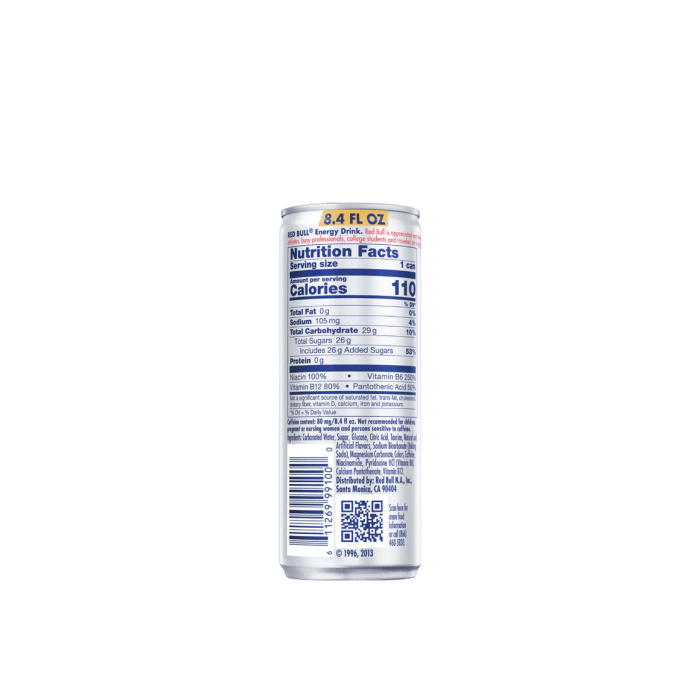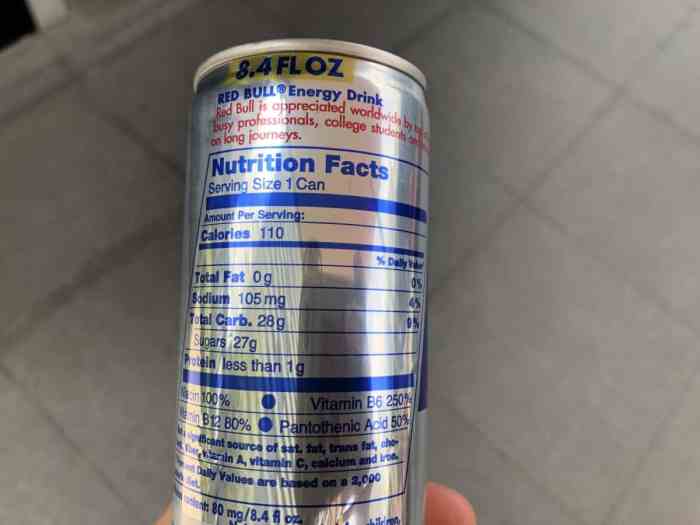Nutritional Content Breakdown

8 oz red bull nutrition facts – Yo, Medan peeps! Let’s break down the nutritional facts of that 8 oz Red Bull you’re probably sipping on right now. We’re keeping it real, no fancy jargon here, just the straight dope on what’s in your can.
Understanding the nutritional content of your drinks is crucial, especially for those who lead active lifestyles or are conscious of their health. Knowing what you’re putting into your body empowers you to make informed choices.
Nutritional Components of an 8 oz Can of Red Bull, 8 oz red bull nutrition facts
Here’s the lowdown on the nutritional makeup of that Red Bull, presented in a way that’s easy to digest (pun intended!). We’ll look at the key components – calories, carbs, sugars, protein, and fat. Remember, these values are approximate and can vary slightly depending on the specific Red Bull flavor.
| Nutrient | Amount (per 8 oz can) | Source | Notes |
|---|---|---|---|
| Calories | ~90-100 | Primarily from sugars and carbohydrates | The calorie count varies slightly depending on the flavor. |
| Carbohydrates | ~22-27g | Primarily from sugars | These provide quick energy. |
| Sugars | ~27g | Sucrose, glucose, and fructose (a mix of simple sugars) | This is a significant portion of the drink’s composition. |
| Protein | ~0g | Negligible | Red Bull is not a significant source of protein. |
| Fat | ~0g | Negligible | Red Bull contains practically no fat. |
Macronutrient Proportion Visualization
Imagine a simple pie chart representing the macronutrient breakdown. Since Red Bull is almost entirely carbohydrates (mostly sugars), the vast majority of the pie, say about 95%, would be a single slice representing carbohydrates. The remaining 5% would be split almost equally between protein and fat, each representing a tiny sliver.
This visualization clearly shows that Red Bull’s caloric content is almost exclusively derived from carbohydrates, primarily sugars. This is important to remember when considering the drink’s impact on your overall dietary intake and energy levels.
Caffeine and Other Stimulants

Yo, Medan peeps! Let’s get real about the kick you get from that 8 oz Red Bull. We’re diving deep into the caffeine and other stimulants that make it the energy drink of choice for many. It’s not just about the taste, it’s about that zing!
An 8-ounce can of Red Bull typically contains around 80mg of caffeine. That’s a decent amount, but how does it stack up against other popular drinks? Knowing this can help you manage your caffeine intake and avoid any unwanted jitters or crashes.
Caffeine Content Comparison
Here’s a quick rundown of the caffeine content in some common beverages, so you can get a better idea of where Red Bull fits in the caffeinated world. Remember, these numbers can vary slightly depending on the brand and preparation.
- Red Bull (8 oz): Approximately 80mg
- Starbucks Coffee (Grande): Ranges from 150-330mg, depending on the type of coffee.
- Coca-Cola (12 oz): Approximately 34mg
- Energy Drink (various brands, 16oz): Can range from 160mg to over 200mg.
Effects of Caffeine and Taurine on the Body
Caffeine, as we all know, is a central nervous system stimulant. It increases alertness, reduces fatigue, and can even improve physical performance in some cases. However, Red Bull also contains taurine, an amino acid that plays a role in various bodily functions. The combined effects of caffeine and taurine are believed by some to enhance the stimulating effects of caffeine, leading to that extra “oomph.” But, remember, moderation is key!
The sugar rush from 8 oz of Red Bull is undeniably tempting, but the sheer amount of caffeine and sugar can leave you feeling jittery and ultimately depleted. For a healthier alternative, consider the nutritional profile of lean protein sources like smoked turkey nutrition facts , which offer sustained energy and essential nutrients. Returning to the Red Bull, remember that mindful consumption is key to avoiding the negative consequences of its potent ingredients.
Potential Risks of High Caffeine Consumption
While a moderate amount of caffeine can be a harmless pick-me-up, excessive consumption can lead to some not-so-fun side effects. Think anxiety, insomnia, rapid heartbeat, and even digestive upset. Red Bull’s manufacturer, like most energy drink companies, advises against excessive consumption, especially for pregnant women, children, and individuals sensitive to caffeine. Always check the label and listen to your body.
Too much of a good thing can easily become a bad thing, so be mindful.
Ingredient Analysis: 8 Oz Red Bull Nutrition Facts
Yo, Medan peeps! Let’s break down what’s actuallyin* that Red Bull you’re chugging. It’s more than just sugar and caffeine, trust me. We’re diving deep into the ingredient list, looking at their roles and potential effects – both good and bad. Think of it as your ultimate Red Bull ingredient cheat sheet.
Red Bull Ingredients and Their Purposes
Here’s a table breaking down the main ingredients in an 8oz can of Red Bull, their functions, and potential health impacts. Remember, this isn’t medical advice, just some food for thought (pun intended!).
| Ingredient | Purpose | Potential Health Implications (Positive/Negative) |
|---|---|---|
| Carbonated Water | Provides the fizz and base liquid. | Generally harmless; hydration but excessive consumption can lead to bloating. |
| Sucrose (Sugar) | Sweetener, provides energy. | Provides quick energy but excessive intake can contribute to weight gain, tooth decay, and other health problems. |
| Glucose | Another type of sugar, contributes to sweetness and energy. | Similar to sucrose; quick energy source but can negatively impact health with overconsumption. |
| Citric Acid | Provides tartness and acts as a preservative. | Generally safe in moderate amounts; can erode tooth enamel with excessive consumption. |
| Taurine | Amino acid; role in Red Bull is not fully understood, often marketed as beneficial for energy and focus. | Generally considered safe; some studies suggest potential benefits for heart health and athletic performance, but more research is needed. High doses may have negative effects. |
| Caffeine | Stimulant; increases alertness and energy. | Increases alertness and reduces fatigue but can cause anxiety, insomnia, and heart palpitations with excessive consumption. |
| Inositol | Vitamin-like substance; role in Red Bull’s effects is unclear, often linked to improved mood and cognitive function. | Generally safe; potential benefits to mood and cognitive function, but research is still ongoing. |
| Glucuronolactone | Naturally occurring substance; role in Red Bull’s effects is unclear, marketed as aiding in detoxification. | Generally considered safe; limited scientific evidence supporting its purported benefits. |
| Niacinamide (Vitamin B3) | Vitamin; contributes to energy metabolism. | Essential vitamin; deficiency can lead to various health problems. However, excessive intake can cause flushing and other side effects. |
| Panthenol (Provitamin B5) | Vitamin-like substance; contributes to energy metabolism. | Generally safe; plays a role in various bodily functions. |
| Pyridoxine (Vitamin B6) | Vitamin; contributes to energy metabolism and nerve function. | Essential vitamin; deficiency can lead to various health problems. Excessive intake can cause nerve damage. |
| Riboflavin (Vitamin B2) | Vitamin; contributes to energy metabolism. | Essential vitamin; deficiency can lead to various health problems. |
| Vitamin B12 | Vitamin; contributes to energy metabolism and nerve function. | Essential vitamin; deficiency can lead to anemia and neurological problems. |
| Natural Flavors | Adds flavor. | Can vary widely; generally safe but some individuals may have allergies or sensitivities. |
| Acidity Regulator (Citric Acid) | Maintains pH balance. | Generally safe in moderate amounts; can erode tooth enamel with excessive consumption. |
| Color | Adds color. | Specific colors vary; generally safe but some artificial colors may cause allergic reactions in sensitive individuals. |
Ingredient Differences Between Red Bull and Similar Energy Drinks
While many energy drinks share similar stimulants like caffeine, the exact ingredient lists and proportions differ significantly. For example, some brands may use different artificial sweeteners or flavorings, leading to variations in taste and potential health effects. Some might rely more heavily on guarana for caffeine, while others might emphasize different B vitamins. Always check the label to compare the nutritional profile of different brands.
Artificial vs. Natural Sweeteners in Red Bull
Red Bull utilizes sucrose (table sugar) and glucose, both natural sugars, for sweetness. Many other energy drinks opt for artificial sweeteners like aspartame or sucralose to reduce sugar content and calories. The choice between natural and artificial sweeteners is a matter of personal preference and depends on individual health concerns and priorities. Natural sugars provide calories, while artificial sweeteners do not, but some individuals may experience digestive discomfort with artificial sweeteners.
FAQ Compilation
Is Red Bull suitable for everyone?
No, Red Bull is not recommended for children, pregnant or breastfeeding women, or individuals sensitive to caffeine. Consult a doctor if you have underlying health conditions.
Does Red Bull cause a sugar crash?
The high sugar content in Red Bull can contribute to a sugar crash after the initial energy boost. This is due to the rapid increase and subsequent drop in blood sugar levels.
Are there healthier alternatives to Red Bull?
Yes, there are healthier alternatives, including water, unsweetened tea, and naturally flavored sparkling water. These options provide hydration without the added sugar and caffeine.
What are the long-term effects of regular Red Bull consumption?
Regular high consumption of Red Bull may lead to various health issues including sleep disturbances, anxiety, and potential cardiovascular problems. Moderation is crucial.
